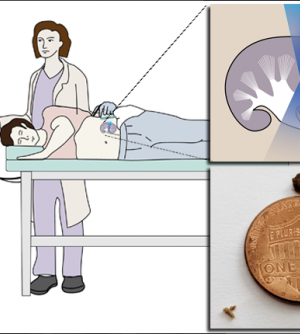- Could Your Grocery Store Meat Be Causing Recurring UTIs?
- Are You Making This Expensive Thermostat Error This Winter?
- Recognizing the Signs of Hypothyroidism
- 10 Strategies to Overcome Insomnia
- Could Artificial Sweeteners Be Aging the Brain Faster?
- Techniques for Soothing Your Nervous System
- Does the Water in Your House Smell Funny? Here’s Why
- Can a Daily Dose of Apple Cider Vinegar Actually Aid Weight Loss?
- 6 Health Beverages That Can Actually Spike Your Blood Sugar
- Treatment Options for Social Anxiety Disorder
Sometimes Kidney Stones Need a Little Nudge, Study Finds

Kidney stone fragments sometimes just need a little push to be flushed out of a person’s system, a new trial finds.
About seven in 10 patients who got ultrasound treatment to encourage fragments to clear from their kidneys wound up free from any further problems, researchers reported recently in the Journal of Urology.
“I think the main takeaways of this study are removing fragments reduces relapse and using a noninvasive, hand-held ultrasound device to help clear these kidney stone fragments [works],” said senior researcher Dr. Jonathan Harper, a urologist with the University of Washington School of Medicine.
As many as 50% of patients who have kidney stones surgically removed continue to have small fragments left behind in their kidneys, researchers explained in background notes.
Of those, about a quarter find themselves returning for another operation within five years to remove the fragments, which grow larger in the intervening years.
For the study, researchers recruited 82 people with kidney stone fragments that had persisted in their kidneys for months. About half were assigned to receive the experimental ultrasound “push.”
While the patients remained awake, doctors used pulses from an ultrasonic wand to move the fragments closer to the ureters — the tubes that carry urine from the kidneys to the bladder.
Once near the ureters, the fragments are more likely to be naturally expelled, sometimes the next time a patient urinates, researchers said.
“I see a lot of potential in this. It could become as common as getting your teeth cleaned. If you have a couple of small stones which could cause future problems, you make an office appointment and in 30 minutes you’re done,” Harper said in a university news release. “This could really revolutionize kidney stone treatment.”
More information
The American Kidney Fund has more on kidney stones.
SOURCE: University of Washington, news release, Sept. 19, 2024
Source: HealthDay
Copyright © 2026 HealthDay. All rights reserved.










